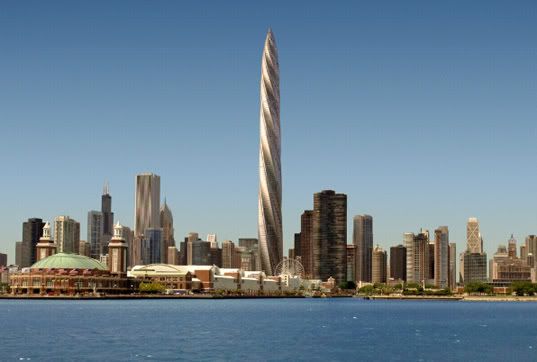A certified Obama-free posting™ !
No artificial ingredients
When they're not busy hectoring us to celebrate diversity and buy bombers with funds from bake sales so the defense budget can go to the teachers unions, the Liberal Establishment is having apoplexy about automobiles and singing the virtues of mass transit. This is one battle — maybe the only one — the Liberal Establishment has decisively lost. The Environmentally Correct may trade in their Volvo nationalpublicradiostationwagons for Priuses (Prii?), but outside a handful of East Coast mega-cities, only the very poor and oppressed subject themselves to getting around town by bus, trolley, or metro.
In his Web site, Steven Dutch, who teaches geology and other hard sciences at the University of Wisconsin, has posted his short essays on a variety of topics. While I am not impressed with his discussions of religion and the paranormal, most of what he has to say about practical issues related to observable fact is probing and convincingly argued. One of his subjects is, "Why People Don't Use Mass Transit". It's particularly à propos now, because with people getting tied in knots about the price of oil, we will undoubtedly be seeing lots more revival-tent meetings in the media about the glory of mass, public, transportation.

Aside from the fact that it is impractical for most purposes for most people, mass transit is inordinately expensive. Not just in money, although that's often so (I understand a single ride on the Underground in London, even if you're going only to the next station, costs about US$8), but even more in time. People consciously or unconsciously put a value on their time, and any form of transportation that makes stops where there's no reason for you to stop will inevitably get you to your destination later than if you are in charge, as you are when you drive.
True, some kinds of public transportation, like a subway train, can whiz you across town faster than you can go in your car, both because of higher speeds and not having to stop at traffic lights. But that advantage is usually negated because to get where you want to go, you have to change lines one or more times, with a wait between trains.
Prof. Dutch writes:
Critics of the automobile point out that in addition to the direct costs of the automobile like fuel, maintenance, and depreciation, there is the cost of highway construction, environmental damage, tax subsidies, defense of oil supplies, and so on – a host of “hidden costs.” …
If traveling by car really does have high indirect costs not shared by public transportation, the case for making all mass transit free is so compelling you really have to wonder why advocates of mass transit don't propose it. Also, since a major cause of urban sprawl and congestion is the middle class moving to the suburbs, the obvious cure is to eliminate the problems that drive the middle class out. Unless there's some master plan to have buses, ambulances and fire trucks all get around on light rail, most of the indirect costs of the automobile will still plague mass transit. We can hope to lessen the dependence on petroleum, and hence ease prices and maybe reduce the defense threat. We might also hope to reduce the costs of road repair, reduce air pollution, and lessen the impact of the automobile.
There's a good reason why people who play the "hidden costs" game never factor in the value of personal time saved — it tips the balance so sharply in favor of existing technology that alternatives simply cannot compete. (Actually, when people say they "cannot" compete, they usually mean they will not compete because they don't think the rewards are great enough. Mass transit can compete against the private auto but it would require subsidies to the hated middle class and suburbs.)
He then goes on to explain why the only way that public transportation could be competitive with the automobile would be for large numbers of people not to own cars, not just not to use them. But for that to happen, the list of requirements is very daunting — particularly because, as he says, almost all of the mass transit preachers would cry foul murder, since lots of money would by definition be spent to benefit "the rich" who are the most attached to their cars.
If anything, Prof. Dutch understates what it would take to convince people to rely on mass transit. I have traveled many times on the subway, trolley, bus, and metro systems in New York, Washington, Boston, and San Francisco, and I'll tell you what: unless the price of gasoline goes to $100 a gallon at the pump, I would still make whatever sacrifice is necessary to drive to and from work rather than commute by mass transit. Public transportation systems are the same everywhere: at rush hours, hideously crowded to the point of being degrading; in between, scarce enough that unless you happen to strike lucky, you wait and wait at the bus stop or in the station. While I may have been paying off negative karma, I still fume and jabber when I think of the hours (probably months in total) of my life I've spent waiting for the bus or metro to show up.

And there's the humiliating dependence. Yes, with a car you run the risk of an unforeseen traffic jam or the odd battery conk-out, but you are still not totally powerless, because there's usually something you can do to overcome the problem. Try finding an alternative when mass transit isn't working. Years ago in San Francisco I joined the same group of people every weekday morning at the bus stop nearest to my house at 7:20 a.m. to catch the 7:30 bus that would take me downtown for my work starting time of 8:15. Invariably, about 7:25, the group would stare nervously down the road for any sign of the bus. With each passing minute, the strain became more evident. People would converse or make jokes, but it was obvious that they were covering up tension. Why? Because, as I soon learned, sometimes the bus didn't show up at all.
If the driver of that particular bus called in sick, there was no back-up. It meant waiting for the next scheduled bus, another half hour or so. Fortunately, I lived far enough from downtown and close enough to the beginning of the line that there was room to get on the later bus — although other commuters, further down the line, not only missed the bus they were supposed to get on but found that the next one was already full. In any case, when I got to work half an hour late, no one asked why, since most of the managers drove in and had no idea about the inadequacies of public transportation; I assume they just figured I'd slept late.

One of the most interesting aspects of Prof. Dutch's argument is when he reports on a dissenting comment that he got. Here is what a reader said:
"people don't ride mass transit because it's costly in time and inconvenient."
Even when this question is asked narrowly by the individual, the question must be: costly in time and inconvenient compared to what? Plus, asking that question without context is meaningless.
There will always a whole range of possible answers to those questions depending on existing context. On top of that, the range of answers to those questions for a society will look DRAMATICALLY different depending on whether you are in a culture that is still committed to the folly of government subsidy and mandate/promotion of mass suburbanization — or whether your culture has learned that the majority of a modern human population should live in dense, mixed-use development patterns because it is the sensible, efficient and equitable way to configure modern society.
That exactly describes the society that mass transit proponents want us to live in: "dense, mixed-use development patterns." That is, people should live exactly the way they show time and again they don't want to, in congested, high-rise urban environments where dwellings and businesses share the street. They may have neighbors on both sides, above, and below them, and no personal space except within the thin walls dividing them from their neighbors, but that's the sensible and efficient and — wait for it — equitable way to live. It isn't fair for some people to surround themselves with space of their own.

There are basically two kinds of people who think this way: New Yorkers and similar urbanites, who have grown up doing everything en masse, find comfort in having lots of others around doing the same things they are, and can't imagine why anyone should want, or be permitted, private space; and academics, especially teaching assistants and graduate students, who live in crowded apartments and (I'm convinced) envy those who go home to single-family homes on tree-lined streets rather than concrete pillboxes. If they, the Deep Thinkers who know what's best for a "modern human population," have to ride the bus or bicycle to work because (whatever rationale they may proclaim) they can't afford to drive out to the burbs or live there, why should self-centered bourgeois pests be privileged to?
Yes, too many suburbs are sterile and monotonous, although developers seem to be gradually getting the hang of providing some color and variety. And there certainly are too many cars on the road. May I point out, once again, that the United States has added 100 million people in the past 30 years, almost entirely through immigration, and that's the main reason why traffic is so bad? Instead of telling people that they ought to live in more dense environments and ride mass transit, we should be stopping almost all immigration and working to reduce the population. That's not only more practical, but more humane, than telling us to live in the city and stuffing us into buses, when and if they show up at the appointed hour.






















